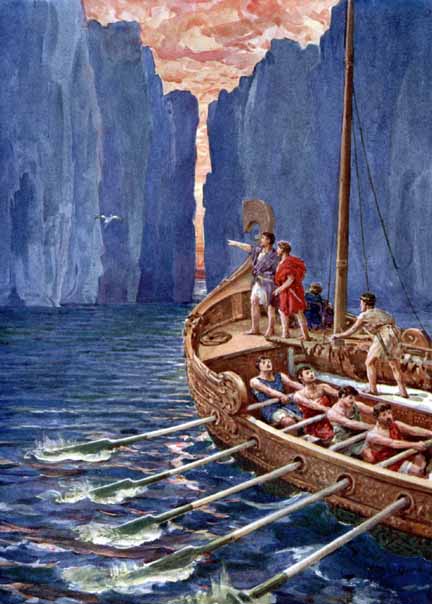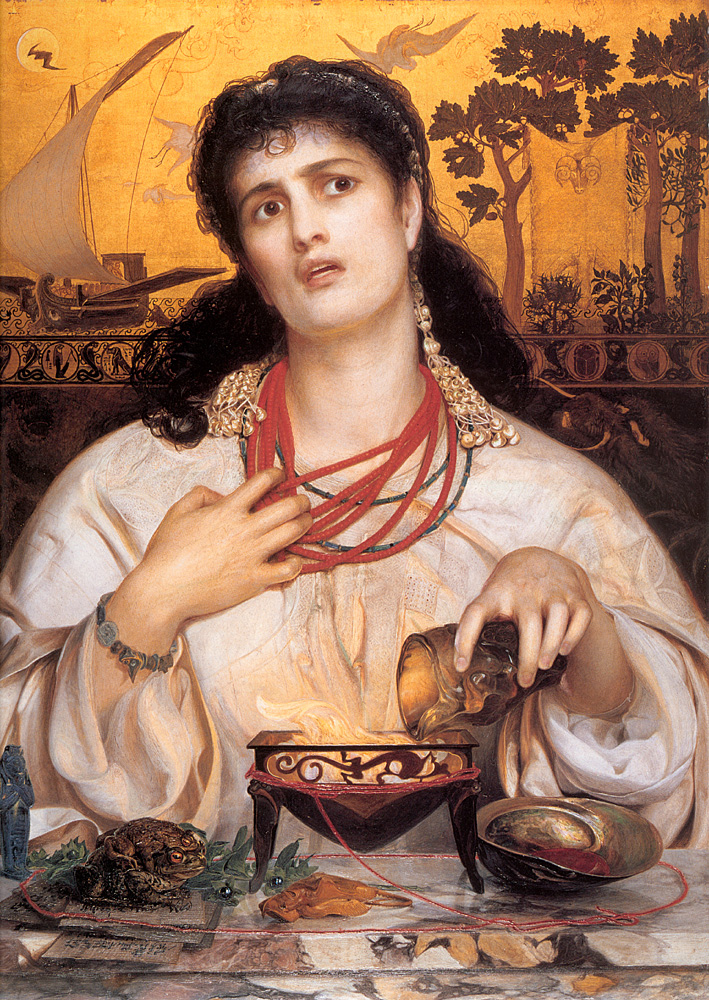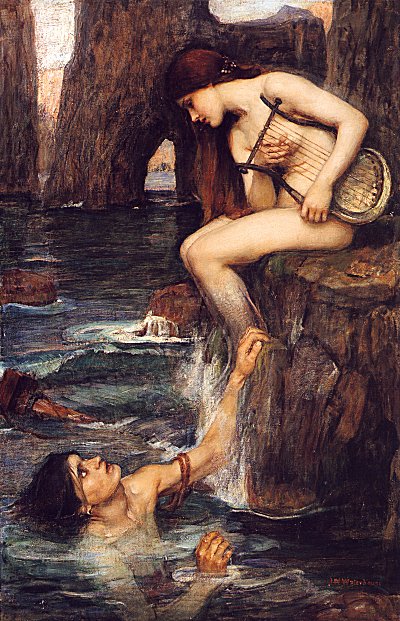Unit 3: Adventure and The Hero’s Journey

Jason and the Argonauts
Adapted from Aunt Charlotte’s Stories of Greek History by Charlotte M. Yonge, $\ccpd$
Pelias, the usurping king of Iolcus, was walking through the marketplace when he saw a handsome young man with hair flowing on his shoulders, two spears in his hand, and only one sandal. He was very much afraid, for it had been foretold to Pelias by an oracle that he would be murdered by a man with one foot bare. And this youth was really Jason, the son of his brother Aeson, from whom he had taken the kingdom of Iolcus. Fearing that Pelias would kill the child, Aeson had sent him away to the cave of the Centaur Chiron, by whom Jason had been raised and had now come to seek his fortune. He had lost his shoe in the mud while kindly carrying an old woman across a river, not knowing that she was really the goddess Juno, who had come down in that form to test the kindness of men, and who was thus made his friend forever. Pelias sent for the young stranger the next day and asked him what he would do if he knew a man standing in front of him was destined to kill him. “I would send him to bring me the Golden Fleece,” said Jason. “Then go and get it,” said Pelias.
Jason then began building a ship which he called Argo, and announced the intended expedition throughout Greece, thus gathering together all the most famous heroes then living, most of whom had, like him, been brought up by the great Centaur Chiron. Hercules was one of them, and another was Theseus, the great hero of the Ionian city of Athens, whose strength was almost equal to that of Hercules.
Another Argonaut must be mentioned, and that is the musician Orpheus. He was the son of the muse Calliope and was looked on as the first of the many outstanding singers of Greece, who taught the noblest and best lessons. His music, when he played on the lyre, was so sweet, that all the animals, both fierce and gentle, came around to hear it; and not only these, but even the trees and rocks gathered round, fascinated by the sweetness.
All these and more, to the number of fifty, joined Jason in his crew, and they were called “the Argonauts”. The Argo, the ship which carried them, had fifty oars, and the front of the ship was made with a piece of wood from the great oak of Dodona, which could speak for the oracles. When all was ready, Jason stood on the deck and poured wine from a golden cup, praying out loud to Jupiter, to the Winds, the Days, the Nights, and to Fate to grant them a favorable journey. Old Chiron the Centaur came down from his hills to cheer them on and pray for their return; and as the oars kept measured time, Orpheus struck his lyre in tune with their splash in the blue waters.
They made a stop in Mysia, where a youth named Hylas went ashore to bring back some fresh water but was caught by the nymphs of the stream and taken captive. Hercules, hearing his cry, went in search of him, and, as neither returned, the Argo sailed without them. No more was heard of Hylas, but Hercules went back to the city of Argos.
They next visited Phineus, a wise old blind king, who was being harassed by nasty birds with women’s faces called Harpies. These monsters always came down when he was going to eat, ate the food, and spoiled what they did not eat. The Argonauts having among them two winged sons of Boreas (the north wind), hunted these horrible creatures far out into the Mediterranean. Phineus thanked them for helping him and then told them that they would have to pass between some floating rocks called the Symplegades, which were always surrounded in mist, were often driven together by the wind, and crushed whatever was between. He told them to let go of a dove and let it fly, and if it went through safely, they should follow. They did so, and the dove came out at the other side, but with her tail feathers clipped off as the rocks met. However, on went the Argo, each hero rowing for his life, and Juno and Athena helping them; and, after all, they were but just in time, and lost the decorations on the back of their ship!
The Success of the Argonauts
When Jason arrived at Colchis, he sent for King Æetes, and asked him for the Golden Fleece. Æetes replied that he might have it, provided he could control the two copper-footed bulls with flaming breath, which had been a present from Vulcan, and with them plow a piece of land, and sow it with the dragon’s teeth. Athena had given Æetes half the teeth of the dragon of Thebes, which had been killed by Cadmus.
The task seemed beyond Jason’s reach, until Medea, daughter of Æetes and a priestess of the goddess Hecate, goddess of magic, promised to help him, on condition that he would marry her and take her to Greece. When Jason agreed to promise to do so, Medea gave him a magic lotion to rub on himself and his shield and spear. For a whole day afterward, neither sword nor fire would hurt him, and he would thus be able to master the bulls. So he found the bulls; he secured them to the plow, and then he sowed the teeth, which came up, like those sown by Cadmus, as armed men, who began to attack him, but as Medea had advised him, he threw a stone among them, and they began to fight with one another, so that he could easily kill the few who refused to fight each other.
Still, Æetes refused to give him the fleece and was about to set fire to the Argo and kill the crew, but Medea warned Jason in time and led him to the spot where the fleece was nailed to a tree. Orpheus lulled the guardian dragon to sleep with his lyre while Jason took down the fleece, and Medea joined them, carrying in her arms her little brother whom she had stolen from his bed with a cruel purpose, for when her father found out what was going on and started running toward them, she cut the poor child into pieces, and tossed his limbs into the stream of the Phasis, so that, while her father tried to collect them, the Argo had time to sail away.
The Argo did not return by the same route but went to the north and came to the isle of the goddess Circe, who happened to be Medea’s aunt, who purified Jason and Medea from the blood of the poor boy. Then they came to the island of the Sirens, creatures that looked like beautiful girls who stood on the shore singing so sweetly that no sailor could resist the charm, but the moment any man reached the shore, they strangled him and sucked his blood. Warned by Medea, Orpheus played and sang so magnificently as to drown out the sound of the Sirens’ fatal song, and the Argo came out into the Mediterranean somewhere near Trinacria, the three-cornered island now called Sicily, where they had to pass between two lofty cliffs. In a cave under one of these lived a monster called Scylla, with twelve limbs and six long necks, with a dog’s head on each, ready to capture a man out of every ship that passed, but it was safer to keep on her side than to go to the other cliff, for there a water-witch named Charybdis who lived in a whirlpool, and was sure to suck the whole ship in, and swallow it up. However, Achilles’ mother Thetis and her sister Nereids came and guided the Argo safely through.
As they passed the island of Crete, a giant robot named Talos, who was created by Hephaestus by request of Zeus to protect Europa, began throwing boulders at the ship. Every day he circled the island, guarding it, and had one vein, which went from his neck to his ankle, bound shut by only one bronze nail. Medea hypnotized him from the Argo, deceiving him into believing that he could become immortal by removing the nail. When he dislodged the nail, the ichor ran out of him like molten lead,” exsanguinating and killing him. Jason and the Argonauts could then safely continue their journey home.
When the crew returned to Iolcus, they had only been gone for four months, and Jason gave the fleece to his uncle Pelias and dedicated the Argo to Neptune. He found his father Aeson had grown very old, but Medea decided to restore him to youth. She went forth by moonlight, gathered a number of herbs, and then, putting them in a witches’ brewing pot, she cut old Aeson into pieces, threw them in, and boiled them all night. In the morning Aeson appeared as a lively black-haired young man, no older than his son. Pelias’ daughters came and begged her to teach them the same spell. She pretended to do so, but she did not tell them the correct herbs, and thus the poor girls only killed their father, and did not bring him to life again. The son of Pelias drove the treacherous Medea and her husband from Iolcus, and they went to Corinth, where they lived ten years, until Jason grew tired of Medea, and divorced her in order to marry Creusa, the king’s daughter.
In her rage, Medea sent the bride the fatal gift of a poisoned robe, then she killed her own children, and flew away in a chariot drawn by winged snakes, to the east where she became the mother of a son named Medus, from whom the nation of Medes originated. As for Jason, he had fallen asleep at noon one hot day under the shade of the Argo, where it was drawn up on the sand by Neptune’s temple, when a bit of wood broke off from the top edge, fell on his head, and killed him.
Comprehension Questions
Answer the following questions according to the story.
- What is the relationship between Pelias and Aeson? What is Pelias trying to do to Aeson?
- Why is Pelias scared of Jason?
- What does Pelias send Jason to do?
- What is so special about the ship Argo?
- Who are the people who Jason had come with him onto the Argo?
- What happened to Hylas and Hercules?
- What happened to Phineus, and who is he?
- When Jason finally reaches Colchis, what does King Æetes tell Jason to do?
- Who agrees to help Jason, and what is the catch?
- How does (the person in 9) help Jason?
- What cruel thing does Medea do to her brother, and why?
- Who is Circe?
- Who are the sirens, and who helps “defeat” them, and how?
- Who (or what) is Talos?
- What does Medea do to Aeson?
- What did Medea do when Pelias’ daughters wanted to learn how to do what she did in 14, and what was the result?
- What happens to Jason at the end of the story?
Critical Thinking Questions
Answer the following questions. Compare your answers with a partner.
- What kinds of things does Medea do? What do you think of her?
- Explain the kind of relationship that Jason and Medea have. Is it a good one?
- At the end of the story, what can we assume happened to Aeson?
- Jason’s ending is somewhat different from most heroes’ stories. What is different and why do you think it is different?
- At the beginning of the story, Pelias was afraid of Jason because he had heard that he would be killed by a man with one shoe on. Did Pelias’ fate come true?
Vocabulary from the Story
Answer the following questions. Compare your answers with a partner.
Siren:
- What do sirens look like according to the story?
- What do sirens look like according to a Google Images search?
- What are 2 different meanings of sirens, and how are they related to the Greek creature?
- Why do you think Starbucks chose a siren for their logo?

photo by Charity Davenport, $\ccbyncsa$
Scylla and Charybdis:
- What are Scylla and Charybdis?
- What does the idiom “stuck between Scylla and Charybdis” mean? (We also say “stuck between a rock and a hard place.”)
- Give an example of a time you were stuck between a rock and a hard place.
CEFR Level: CEF Level B2









